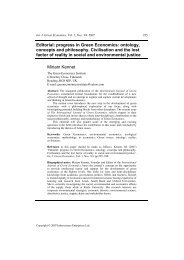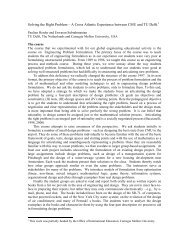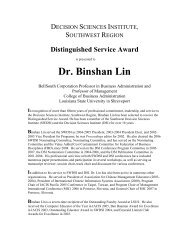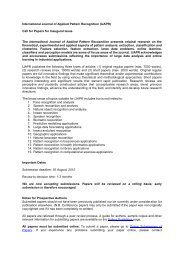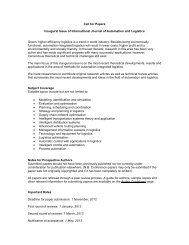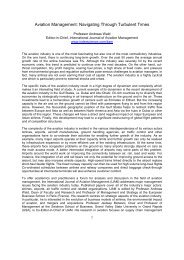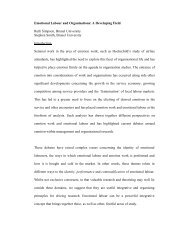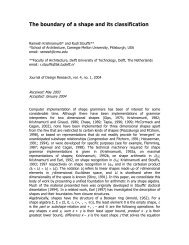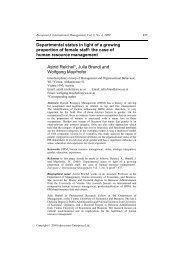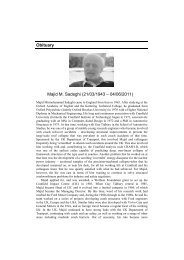A new Zeitgeist for international business activity and ... - InderScience
A new Zeitgeist for international business activity and ... - InderScience
A new Zeitgeist for international business activity and ... - InderScience
You also want an ePaper? Increase the reach of your titles
YUMPU automatically turns print PDFs into web optimized ePapers that Google loves.
280 J.H. Dunning<br />
• We live in a world of economic <strong>and</strong> political turbulence; where change, volatility,<br />
insecurity <strong>and</strong> complexity are among its endemic features.<br />
• We live in a world in which the capability to access, create <strong>and</strong> utilise knowledge<br />
is one of (if not the) most important competitive advantage of firms (Nonaka et al.,<br />
2000); <strong>and</strong> one in which falling communication costs are dramatically reconfiguring<br />
our economic l<strong>and</strong>scape <strong>and</strong> the fabric of our daily lives.<br />
• We live in a world in which the sustainability of natural resources e.g., especially<br />
fossil fuels, is being increasingly called into question. We also live in a world in<br />
which global climate change is challenging our perceptions about the deployment<br />
<strong>and</strong>/or replacement of such resources.<br />
• We live in a world replete with paradoxes <strong>and</strong> tensions. Globalisation brings with<br />
it its own ‘yang’ <strong>and</strong> ‘yin’: where convergence <strong>and</strong> divergence, uni<strong>for</strong>mity <strong>and</strong><br />
diversity, competition <strong>and</strong> cooperation, centralisation <strong>and</strong> decentralisation,<br />
<strong>and</strong> individualism <strong>and</strong> communitarianism go h<strong>and</strong> in h<strong>and</strong>; where false choices<br />
abound; where progress <strong>and</strong> backlashes are common bedfellows.<br />
• We live in a world in which the intent <strong>and</strong> content of human development are being<br />
constantly appraised. Compared with the past, more attention is now being paid to<br />
the social, cultural <strong>and</strong> ideological wellbeing of individuals <strong>and</strong> communities, <strong>and</strong><br />
also to the moral dimension of economic progress.<br />
• We live in a world in which the global competitiveness of corporations <strong>and</strong> the<br />
prosperity of countries is increasingly dependent on their success in <strong>for</strong>ming, <strong>and</strong><br />
learning from, cross-border cooperative ventures, <strong>and</strong> of being part of a network<br />
of related activities.<br />
• We live in a world in which the content <strong>and</strong> quality of incentive structures <strong>and</strong> belief<br />
systems – including religious perspectives – are increasingly influencing societal<br />
attitudes <strong>and</strong> policies towards globalisation, <strong>and</strong> to the social responsibilities of both<br />
firms <strong>and</strong> governments.<br />
• We live in a world in which the content <strong>and</strong> significance of legitimacy of the main<br />
constituents of global capitalism (<strong>and</strong> especially that of MNEs) is being increasingly<br />
questioned.<br />
• In short, we live in a world in which the human <strong>and</strong> physical global environment<br />
underpinning the intentions of individuals, wealth-creating activities of firms, <strong>and</strong><br />
the policies of national governments, is rapidly <strong>and</strong> radically changing. And, we<br />
believe, it is the firms <strong>and</strong> governments which are best able to respond to <strong>and</strong> benefit<br />
from these changes, <strong>and</strong> which are best equipped to minimise or counteract their<br />
disruptive effects, that are the most likely to prosper in today’s hugely competitive<br />
global village.<br />
3 The <strong>Zeitgeist</strong> cocktail<br />
What do these characteristics add up to? Do they point to a cocktail of happenings<br />
which, between them, make up a <strong>new</strong> <strong>Zeitgeist</strong>? Or is it more a case of ‘old wine in <strong>new</strong>




